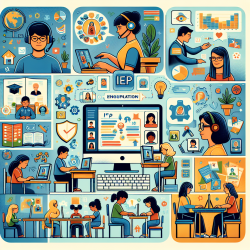Introduction
In the realm of speech-language pathology, the importance of data-driven decision-making cannot be overstated. As practitioners dedicated to improving outcomes for children, we must continuously seek innovative ways to leverage data to enhance our practices. The research article "Open Access Data Sharing in Genomic Research" provides valuable insights into how open access data can be utilized effectively while addressing privacy concerns. This blog will explore the implications of these findings for practitioners in the field of speech-language pathology, encouraging further research and implementation of open access data sharing.
The Power of Open Access Data
Open access data sharing has emerged as a significant legacy of the Human Genome Project, aiming to maximize the utility and public benefit of genomic research. The research highlights that a considerable number of participants are willing to share their genomic data openly when given the choice. This willingness to share data presents an opportunity for speech-language pathologists to access a wealth of information that can inform evidence-based practices and improve outcomes for children.
Balancing Privacy and Autonomy
While open access data sharing holds immense potential, it is crucial to address privacy concerns and respect participant autonomy. The research advocates for a balanced approach that allows individuals to make informed decisions about sharing their data. For speech-language pathologists, this means ensuring that data is used ethically and responsibly, with appropriate safeguards in place to protect the privacy of research participants.
Implications for Speech-Language Pathology
Incorporating open access data into speech-language pathology practices can lead to transformative outcomes for children. Here are some ways practitioners can harness the power of open access data:
- Evidence-Based Interventions: Access to a broader range of data can enhance the development and implementation of evidence-based interventions, tailored to the unique needs of each child.
- Personalized Treatment Plans: By analyzing genomic data, practitioners can gain insights into genetic factors that may influence speech and language development, allowing for more personalized treatment plans.
- Collaborative Research: Open access data facilitates collaboration among researchers and practitioners, fostering a culture of shared knowledge and innovation in the field.
Encouraging Further Research
The findings from the research article underscore the need for continued exploration of open access data sharing in speech-language pathology. Practitioners are encouraged to engage in further research to understand the full potential of open access data and its impact on child outcomes. By collaborating with researchers and participating in studies, practitioners can contribute to the growing body of knowledge in this area.
Conclusion
Open access data sharing in genomic research presents a unique opportunity for speech-language pathologists to enhance their practices and improve outcomes for children. By balancing privacy concerns with participant autonomy, practitioners can harness the power of data to drive evidence-based interventions and personalized treatment plans. To read the original research paper, please follow this link: Open Access Data Sharing in Genomic Research.










